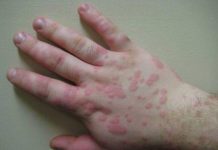Chicken pox, a highly contagious disease, is most commonly found in children between the ages of 5-10 years.
A child infected with chicken pox can develop the signs of infection after 14 to 16 days, after being exposed to infection.
Chicken pox mainly spreads through air and affects the children who have weak immune system.
If your child has weak immune system, then he/she has more chances to get infected with chicken pox by direct contact with the infected or even by breathing the droplets of infection.
The red itchiness on the skin of a child affected with chicken pox is mainly due to presence of varicella-zoster virus, a part of group of viruses called herpes viruses. It easily spreads through air from one person to another through direct contact or by other means.
Most of you might think of chicken pox as a mild disease and at most lasts for about 2 to 3 weeks and also rarely cause complications. But be aware; some times chicken pox can also cause severe complications even in healthy children.
It is very difficult to predict which infected child can develop severe form of infection. Providing a regular vaccine for chicken pox to your child is a better way to prevent the infection and the possible complications.
In very rare cases, when the vaccine is not able to prevent the disease completely, then the resulting infection could be in milder form when compared with the infection affected without vaccination.
Severity of the infection can be identified with these clues:
When you suspect that your child or even your self is affected with chicken pox, immediately consult the doctor for proper attention. Your doctor easily identifies by examining the rashes on the skin and determines whether the infection is chicken pox or not.
Try to seek medical advice immediately, if you find severe infection in your child.
- Rash that spreads to one or both eyes.
- When rash gets warmer and very red, indicating a possible infection of bacteria.
- When you get fever higher than 103’F.
- If you find any uncertainty to the medications used.
- Reduced intake of fluids with persistent dehydration.
Try to consult your health care provider immediately when ever you find these abnormal conditions of infection in your child and avoid the complications.












